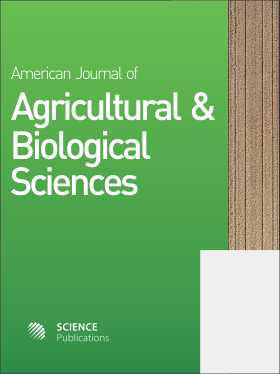Biocontrol of Soil Fungi in Tomato with Microencapsulates Containing Bacillus subtilis
- 1 Departament of Agricultural Parasitology, Universidad Autonoma Agraria Antonio Narro, Buenavista, 25315,, Mexico
- 2 Department of Plastics in the Agriculture, Centro de Investigación en Química Aplicada, Universidad Autonoma de Coahuila, Mexico
- 3 Departament of Food Science and Technology, School of Chemistry, Universidad Autonoma de Coahuila, 25280, Saltillo, Coahuila, 25253, Mexico
Abstract
Problem Statement: An option to reduce pollution by synthetic agro-chemical in root plant disease management is the use of antagonist rhizobacteria belonging to Bacillus genus, because their inhibitory properties, stimulation of plant growth and crop yield increase. Approach: This study was carried out in order to evaluate if Bacillus subtilis strains could play an antagonists role of plant pathogens and if they can be microencapsulated inside a biopolymer matrix. It was adapted an equipment and evaluated a technique for microcapsules elaboration, in order to incorporate B. subtilis strains and to analyze their potential as biocontrol agents by determining their antagonistic effect against pathogenic soil fungi; in addition, it was analyzed their effect on tomato plant growth promotion under greenhouse conditions. B. subtilis strains identified as B1, J1, M2 and their mixture were used; microcapsules containing bacterial strains were inoculated to tomato seeds cv. Floradade. When seedlings emerged, a second application of microcapsules containing B. subtilis was performed on the pots, which previously were inoculated with the fungi Rhizoctonia solani and Fusarium oxysporum. Response variables were: Incidence and disease severity, plant growth, aerial and root dry weight, leaf area and fruit yield. Results: The outcome showed that the equipment designed and adapted for microcapsules elaboration was useful to obtain microcapsules containing the bacterial strains. B. subtilis strains exerted apparent biocontrol, since incidence and disease severity was reduced and for that reason inhibited the infective activity of the inoculated plant pathogens, also microcapsules containing Bacillus strains stimulated tomato growth and fruit yield. Conclusion: Microcapsules containing B. subtilis strains could be effective biocontrol agents against soil fungi plant pathogens and could have a potential biofertilizer effect, since they stimulated growth and yield of tomato plants compared to control.
DOI: https://doi.org/10.3844/ajabssp.2011.189.195

- 7,289 Views
- 8,550 Downloads
- 33 Citations
Download
Keywords
- Rhizoctonia solani
- fusarium oxysporum
- biological control
- microcapsules elaboration
- biocontrol agents
- bacillus subtilis strains
- Plant Growth Promoting Bacteria (PGPR)
- F. oxysporum
- antagonist rhizobacteria
- R. solani
